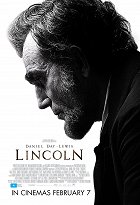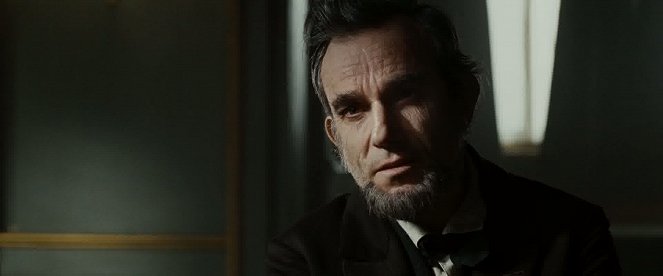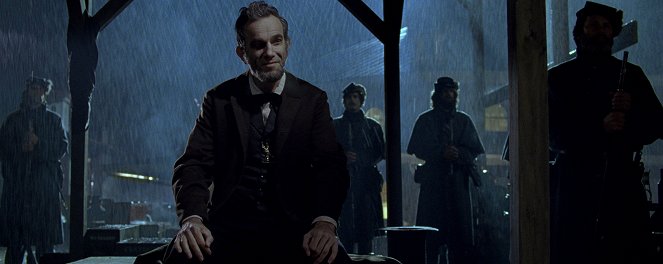Directed by:
Steven SpielbergScreenplay:
Tony KushnerCinematography:
Janusz KaminskiComposer:
John WilliamsCast:
Daniel Day-Lewis, Sally Field, Joseph Gordon-Levitt, Tommy Lee Jones, John Hawkes, Hal Holbrook, James Spader, Tim Blake Nelson, Bruce McGill, Joseph Cross (more)VOD (2)
Plots(1)
A revealing drama that focuses on the 16th President's tumultuous final months in office. In a nation divided by war and the strong winds of change, Lincoln pursues a course of action designed to end the war, unite the country and abolish slavery. With the moral courage and fierce determination to succeed, his choices during this critical moment will change the fate of generations to come. (20th Century Fox UK)
(more)Videos (56)
Reviews (14)
You are watching this historical borefest and keep thinking to yourself "where the hell did Spielberg's dynamism and fierceness in individual shots go, where’s the drive?". Lincoln is beautifully shot, solidly narrated with strong historical foundations, and Daniel Day-Lewis is once again captivating. However, films like this should be at least a little bit accessible to the audience, in other words, they must not be boring and tedious. Unfortunately, this was not the case here even in the slightest.
()
Academy borefest??!! Enslave me, but whoever said this just doesn't have much of a clue as to how far the genius of cinematic storytelling can stretch. Lincoln is a 150-minute long, mostly conversational treasure that, despite the knowledge of the historical outcome, literally engulfs the viewer without a single flinch or flicker of creative indiscretion. A story where there isn't a single scene or line that doesn't fundamentally shift the titular political line or unsentimentally deepen the personal and familial line, which is then logically reflected in the decisions and development of the former. I can't wait to watch it again (and again), to savour more attentively the balanced rhythm with which the lines alternate, overlap and complement each other, the witty interweaving of successive events or the ingenious transitions between scenes, which without exception fit together compositionally and continuously like a full stop at the end of a sentence. Not to mention the brilliant games with lighting and camera positions, the emotions that can only be evoked by the clever handling of editing and narrative direction, and finally the performances of absolutely everyone who appears in front of the camera. Lincoln convinced me of two things: that Abraham Lincoln was one of the greatest figures of the 19th century (even allowing for the undeniable glorification of the film, of course) and that Steven Spielberg is the greatest Hollywood director of all time.
()
In some ways, Lincoln uncomfortably reminded me of last year's sensational The Help. Probably due to the film’s ostentatious clinging to the fact that black and white, truth and falsehood have no shades. Spielberg made a film that reminded me of Eliad's concept of an absolute epic time. It is not a historical drama. It's a myth. A myth in which politicians disintegrate into enlightened progressivists, hysterical obscurantists and spineless "hesitators". A myth in which we do not ask what motivates the main character to such a determined attitude, what drives him forward, because the main character himself is the absolute truth (although it suggests a certain internal ruggedness in the film, the film never lets it prevail and disrupt the state aura). Lincoln could not have wished for a better form than Daniel Day Lewis imprinted on him - slow, deliberate, genial, infinitely kind, yet convinced and convincing to the bone. Spielberg treats the character with striking iconicity - the way he places him in the shots, the way he uses the meaning-creating light, only confirms to us that Lincoln the mortal is not in front of us, but rather Lincoln the icon. When the president dies, Steven draws a baroque shot in which life is darkness and death is light ("He has gone to Eternity"). The Hagiography of the Saint, including the structure of the narrative - an exposition revealing the world in imbalance / enlightenment through dream / rectification / martyrdom (something that has worked well since the Middle Ages, through messianism, to this day). I'm not making fun of it, I’m not questioning it. I've seen other deified lumens with a far greater degree of dilettantism, and it does not bother me in Lincoln. But it also doesn't affect me in any way. This is a film-ritual for believers, whether "Lincoln" or "Spielberg" lovers, who will compete in praising how narratively and formally brilliant it is (and it indeed is). I do not deny the film the visual captivation of classical art, nor the narrative prowess with which Spielberg brings humor to the leather framework of parliamentary debates and skillfully alternates spatial-temporal plans. But the film is cold, simplistic in some respects, avoiding real problems... I have to smile a little: when Lincoln bribes the Democrats to help him out, we can agree that he's doing the right thing (because he represents the truth, "it's a long time ago", and moreover it's filmed as a comedy). But when the protagonist of The Ides of March does the same thing, it's disgusting pragmatism, dirt, disgusting politics, and American critics are writing about a film that today's America doesn't need. Today's America certainly needs Lincoln and a solid granite myth. As a spectator, I don't need to see anything like this, even if it has a more self-virtuoso form. It is, in my view, self-affirming ideological boredom that defends any doubts by eradicating them with the schemes seen a hundred times, to which the elite actors' faces and the proven structure of the narrative give the impression of uniqueness. But such a film is not able to offer me anything important for life, just a yawning abyss of distance from the perfectly coherent and closed world of myth. With all due respect, Mr. Spielberg.
()
(less)
(more)
Not enough of Janusz Kamiński’s impressive exterior shots (two, to be exact: Joseph Gordon-Levitt watching body parts being covered with soil and the pair sitting on the porch). Too few emotional scenes in which John Williams could show off. Too few
relationship storylines that would increase interest in the characters and their fates. Too little of anything that would
intrigue viewers who are not interested in these particular historical events. Elegantly filmed and well-played interior
history tedium. Daniel Day-Lewis is excellent as always.
()
Big words, lofty speeches, and in a way, just one big Abraham Lincoln bon mot. Steven Spielberg adored this part of American history so much that he simply made a passage from a history textbook. The brief family passages reveal sparse fragments about the main character while the movie strives purely for annotation, peace, and political negotiation. No emotions, no enthusiasm. Just with perfectly crafted production and zero added value. And we all knew even before the first applause that Daniel Day-Lewis wouldn't just play Abraham, but he would completely become him. The disappointment is even greater now, since Steven has obviously filmed a(nother) magnum opus of his dreams and yet managed to entertain me only with some unbridled Tommy Lee Jones and, as expected, the scene of the actual voting itself. After seeing this, the slightly problematic War Horse now looks like a perfect period piece.
()



Ads